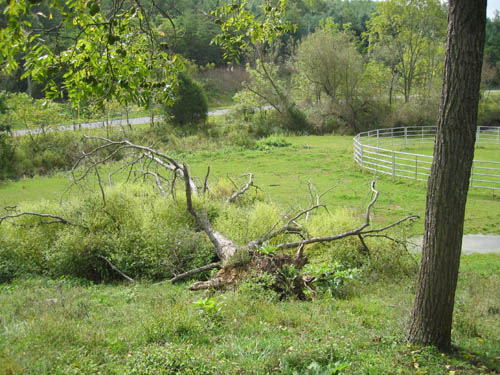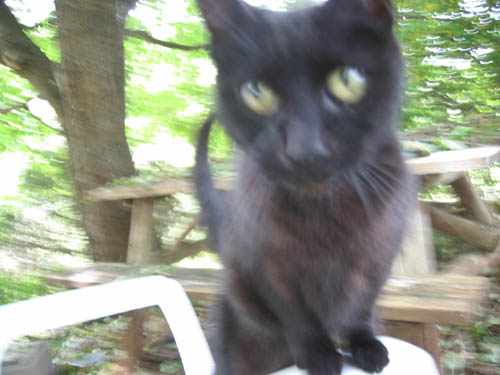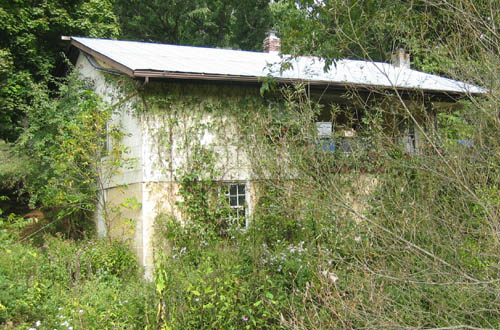|
|
|
hey who's on trial?
Thursday, September 16 2004
setting: 5 miles south of Staunton, Augusta County, Virginia
In the full light of day I went around looking at the old childhood farmstead expecting to be overwhelmed by the changes. A big White Oak on the edge of the floodplain had toppled over and was now sheltering a 1/8 acre patch of six foot tall Jewelweeds on either side of a robustly-flowing drainage ditch that, given recent weather, should have been dry. More on that in a bit. Then there was the new barn, which as purely-utilitarian building wasn't much to look at, but it's clearly more useful than the ruins it replaced. Most of those ruins have been burned to ashes and nails in a nearby fire pit, although the most of the metal roofing has to be disposed of in some other manner. My brother Don managed to get an unexpectedly large sum when he took a semi-melted mass of aluminum roofing to the local recycler. On the other hand, the galvanized roofing that comprised the bulk of the barn's roof metal is virtually worthless.
Meanwhile there have been some changes with the neighborhood. The folks across the road, the ones with whom we had prolonged feud that relaxed in recent years, have moved away after dividing their meagre four acres into two plots and selling them. The southernmost plot was bought by someone who tore down an old "rattle shack" and replaced it with a modest double-wide trailer and septic field. Between the doublewides on that side of the street and my vine-choked childhood home on this side, that stretch of Stingy Hollow Road would make for a good set for just about any hill billy movie.
I walked along Folly Mills creek and looked approvingly at the flowing water, the watercress, and the incursions of thickets of tall summer vegetation that have flourished in the absence of much goat browsing. The farm animals are now down to three horses (one in her thirties and another in her late 20s), one goat, no dog, no chickens, and one aging cat. Don was following along with me, talking reasonably about things other than Jurassic bird evolution or the relative competence of totalitarian foes in World War II. I happened to notice the wording stitched on his shirt, which read
"Life can only be glorified through labor."
- Don Olin Mueller
I immediately recognized something suspiciously familiar about it, and it wasn't that Don had ever said it either. When I noticed it, Don immediately began defending it as not being a Nazi slogan. But that's when I remembered where I'd seen this phrase before. The Nazis had put up very similar slogans on the gates of their concentration camps in an effort to get their slave laborers to work harder. It was typical Don - outrageously offensive in sympathies for some American foe from the past. (He doesn't pay enough attention to the present to praise Osama bin Laden, but if bin Laden had been knocking down skyscrapers back in the 40s, Don would definitely be talking about him a lot now.) Apparently Don has found some guy in Staunton who will stitch any slogan one wants on a golf shirt, and his services now compete with cheeseburgers, dinosaur books, and scale military models.
As I walked along the stream, I noticed what appeared to be a log jam that had dammed up the water to the point where it was spilling over its banks. I couldn't really see the logjam through the weeds, but its results were clear enough. The overflowing water was responsible for the unusual flow in the floodplain drainage ditch I'd seen earlier. Then I saw something that explained everything: a couple stumps from trees that had obviously been felled by a beaver. What I'd seen wasn't a logjam - it was beaver dam! In the entire time I'd lived near Staunton I'd never seen any evidence of beavers, so it hadn't registered in my mind as a possibility. Evidently, though, beaver populations have been exploding and now they've been pushed into unsuitable habitats such as Folly Mills Creek. I say unsuitable because Folly Mills is an unusually large creek for a beaver to dam. It's also prone to devastating floods, particularly in hurricane season and spring melt.
I ran back to the house to tell my mother and father, since they obviously didn't know about it. As expected, my father's first reaction was horror. He never greets change with any other reaction. "They'll kill all the trees!" he cried. What was unexpected was that he didn't immediately want to rush down to see it. At first it seemed he might just remain in front of the television. (It only gets one channel, the local ABC affiliate, and it's on continuously, no matter how vapid the programming.) But I finally managed to coax him out of the house. Evidently the numbness in his feet makes it so he doesn't want to leave the house any more. The only exercise he gets these days comes in the form of situps and pushups. He said that he did 100 pushups yesterday, a number I doubt I could match.
In the evening, after a meal comprised largely of shrimp, I drove my father out to the Augusta County Medical Center in Fishersville so he could get his MRI. We won't know the results for a few days. I noticed that my father's clothes, the "nice" ones he only wears on the few occasions he leaves the farm, were both visibly stained and somewhat smelly. They had that moldy funk I'd smelled in the house generally, though with more of a hint of having been kept in a closet. It's the way clothes smell after spending a summer in a tent. And he was completely oblivious. Between nervousness and low-level Parkinson's syndrome, he was too shaky to fill out his forms, so I had to do it for him. Then he found things to get worked up about, particularly the fact that the MRI would require him to lie still for twenty minutes. It was all pretty easy for me, so I was laid back about everything. As we walked out to the car, he told me that I had been a great help and was being much more pleasant than Hoagie (my mother, his wife) would have been. She's a martyr about absolutely everything she does, even taking someone to the hospital when he's ill.

A large fallen White Oak on the edge of the floodplain, with its sheltered thicket of Jewelweed. Click to enlarge.
[REDACTED]

Don glorifying his life (digging a post hole).

The three acre marsh. Click to enlarge.

The Kitten, who dates back to before I started keeping online journals.

My childhood home, increasingly swallowed by vegetation.
With the drive from New York, I've been exposed to a bunch of MP3s I ripped using StationRipper. I've been particularly enjoying music from the band Interpol, a sort of modern ripoff of the Joy Division sound. There's a little more to them than that, with hints of Nirvana and even Guided by Voices (particularly in the robotic chugging of their minor-key two-part rhythm guitar). I'm a little embarrassed to admit to liking what with their derivative sound and occasionally overwrought lyrics (which, when not overwrought, make absolutely no sense whatsoever). But the songs are great. I love that mechanical rhythm guitar sound, and when paired with a high-register Joy Divisionesque bass and the exasperated pessimism of Joy Divisionesque vocals, how can I not like this stuff? My initial favorites (some of which aren't yet released) included "Evil," "PDA," and "Take You On a Cruise." "Evil" is an example of a song that uses its weaknesses as strengths. It does this simply by contrasting weak passages with stronger one later in the song. Early in the song there's a passage having almost a whiteboy hip-hop quality to the lyric delivery, and it's so unconvincing that it almost sounds like Dork Rock (think They Might Be Giants or even Weird Al Yankovic). But then that same delivery coincides with the cold robotic heartbeat of those chugging guitars and you recognize this as something a hell of a lot more menacing, if not fully in keeping with the name of the song.
For linking purposes this article's URL is:
http://asecular.com/blog.php?040916 feedback
previous | next |




